The Binational Legal Clinic Begins Operations
Detalle BN6
- Inicio
- The Binational Legal Clinic Begins Operations
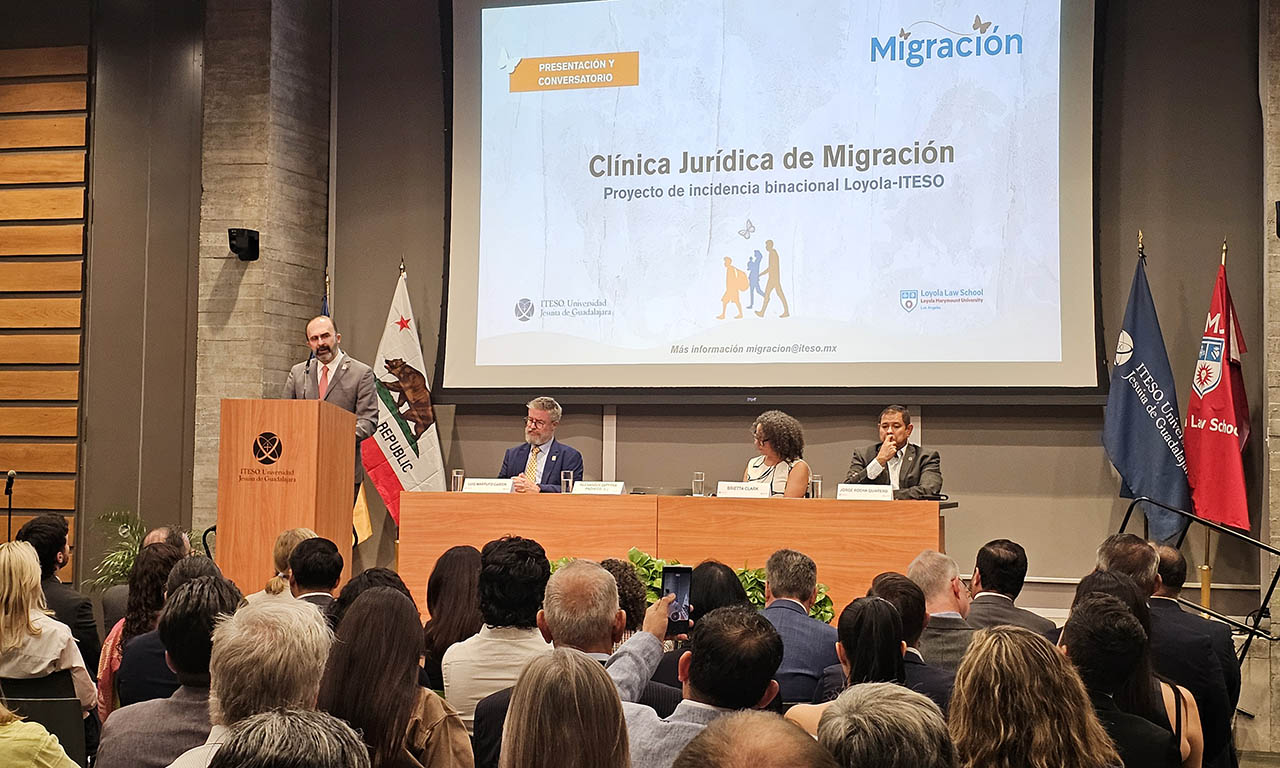
The Binational Legal Clinic Begins Operations
ITESO and Loyola Marymount University have launched a project aimed at providing legal advice and psychological support to people in situations of human mobility in the Guadalajara Metropolitan Area.
Édgar Velasco
Every year, thousands of monarch butterflies travel from southern Canada and the northern United States to central Mexico. They fly nearly 5,000 kilometers, and nothing stops them — not even borders. Their orange and black wings serve as a symbol of the work that will be carried out by the Binational Legal Clinic, an initiative led by ITESO and Loyola Marymount University in Los Angeles, California. “Like the butterflies, we cross borders,” said Marissa Montes on screen to close the video shown during the official presentation of the project — an event that marked the beginning of the clinic’s operations.
ITESO and Loyola Marymount University share a common identity as institutions entrusted to the Society of Jesus. Now, they also share a binational advocacy project that seeks to build a more just and compassionate environment for people in situations of human mobility — whether they are in the process of migrating, being deported, returning to their home country, or seeking asylum or refuge.
During the clinic’s presentation, Brietta Clark, Dean of the Loyola Marymount University Law School, acknowledged the vision, leadership, and determination of Marissa Montes, founding academic and director of the university’s legal clinic, as well as the driving force behind the binational initiative. “Loyola University and ITESO have collaborated for seven years providing services to migrants, and today that commitment becomes formal,” said Clark, adding that both institutions share “a pursuit of academic excellence, a spirit of commitment, and creativity to face challenges and support the most vulnerable.”
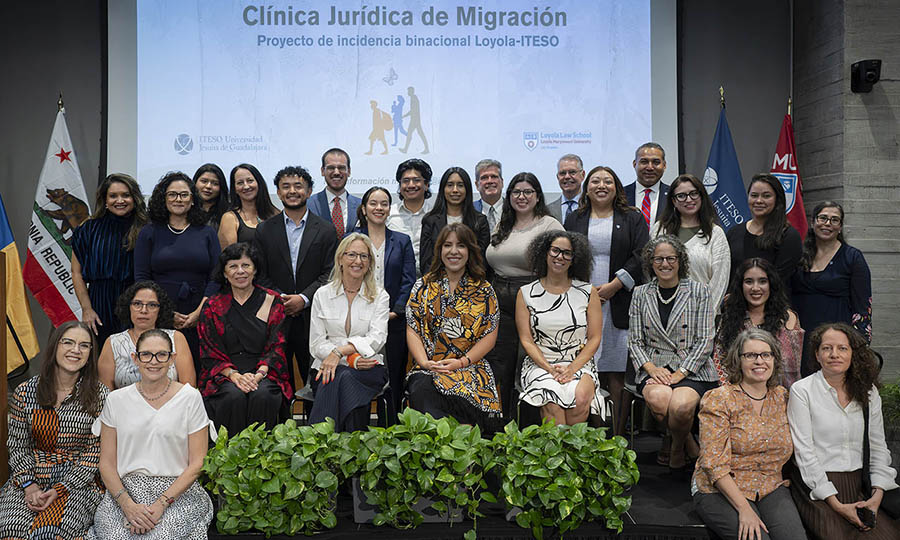
Clark explained that both the Los Angeles clinic and the Guadalajara clinic — which is based at Casa ITESO Madero — aim to educate students while working across three dimensions: first, by providing direct support to migrants, deportees, and refugees; second, by designing policies that promote the creation of a fairer system to ensure human mobility with dignity; and third, by cultivating generations of leaders committed to human dignity and human rights. “It’s a model that is being replicated at other universities, and it’s especially important at a time when human rights and mobility are under attack,” said Clark.
Alexander Zatyrka, SJ, Rector of ITESO, stated that the legal clinic on migration “is a solid, binational initiative that stems from the desire to strengthen collaboration between two universities entrusted to the Society of Jesus and to work toward a positive transformation of society.” He added that the clinic will provide accompaniment and legal representation services to people in situations of human mobility in the Guadalajara Metropolitan Area.
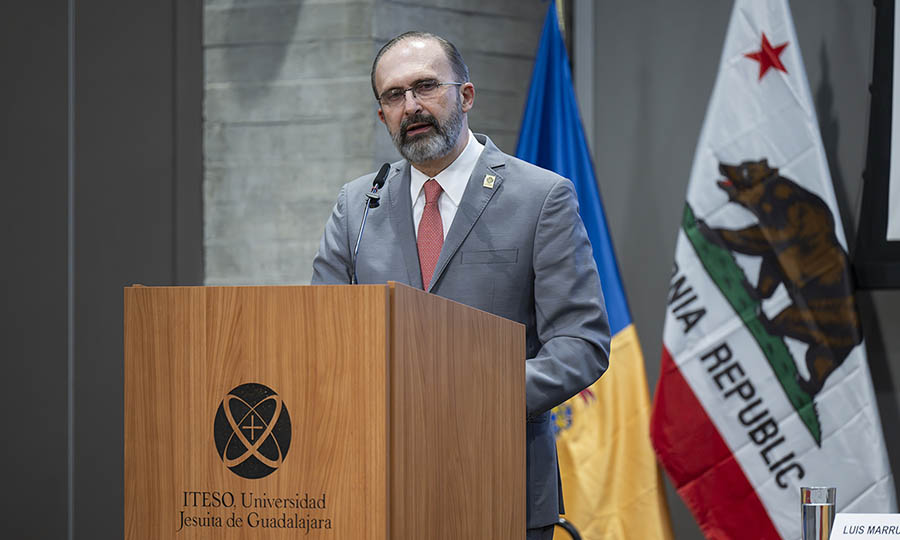
The launch of the clinic’s work is timely because, as the Rector noted, in recent years “there has been an increase in migratory flows driven by poverty, conflict, climate change, and natural disasters. People leave their countries in search of a better living environment in which to develop, but they encounter increasingly hostile conditions in their destinations and, along the way, become victims of human rights violations, labor exploitation, abuse by authorities, and organized crime.”
Zatyrka also spoke about the dual function of legal clinics: first, by providing assistance to people in situations of human mobility; and second, by serving as a training space for students — in ITESO’s case, those studying Law, International Relations, and Public Management — while students from Loyola Marymount University will come to learn legal advocacy. To conclude his remarks, the Rector of ITESO expressed gratitude for the efforts made to “bring to life an initiative that seeks to offer not only legal advice but also a place where people can find hospitality, comfort, and hope.”
“The community defines the goals”
As part of the events marking the launch of the Binational Legal Clinic, a discussion took place featuring Adriana González Arias, professor in ITESO’s Department of Sociopolitical and Legal Studies; Karina Arias, faculty member of the University Center for Social Engagement and member of ITESO’s Migration Affairs Program; and Marissa Montes, academic and founding director of the Legal Clinic at Loyola Marymount University.
The discussion was moderated by Alejandra Guillén, also a faculty member at the University Center for Social Engagement, who began by asking the participants about the context in which the binational project was born. Montes explained that “we are facing something historic that frightens us all. Personally, I had never faced anything like this — [a context in which] the law is not being followed, not only against migrants but also against U.S. citizens.”
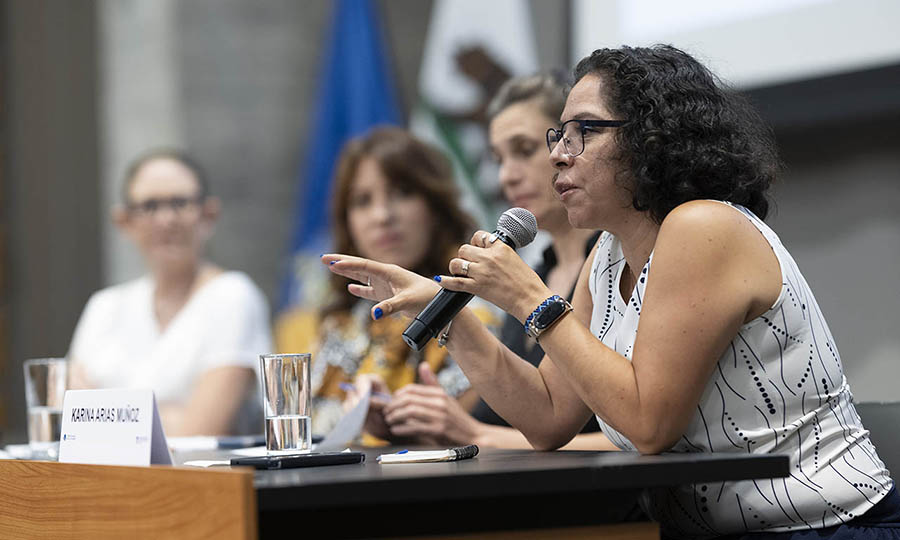
Arias noted that this is “a constantly changing context — often adverse and frustrating, but also rewarding, knowing that we are planting a seed to offer an oasis along people’s journeys. It’s a context in which we must all adapt to the needs of individuals and organizations in order to work together, contribute, and build something more welcoming for migrants.”
Recalling the project’s history, Montes shared how in 2012, shortly after graduating, she founded the Loyola Marymount University Legal Clinic because in the community—made up mainly of Central American migrants—“there was a lack of legal services and advocacy organizations to confront a system built for deportation, not for protection. What we did was work with them; the community defines the goals.” This, she added, set the foundation for the working model now being implemented and soon to be replicated in Guadalajara: to operate based on the needs of individuals and the community. She also spoke about her relationship with ITESO, where she has been a visiting professor each year for the International Summer Program, and how that experience revealed a strong connection between Guadalajara and Los Angeles — which ultimately led to the idea of establishing the binational clinic.
Adriana González Arias explained that the dream of having a legal clinic focused on migration dates back eight years and reviewed how ITESO has been engaged with migration issues by designing academic courses addressing the topic. That’s how the course “Migration, Asylum, and Refuge” was created for the International Summer Program, taught by Marissa Montes and members of FM4 Paso Libre and the United Nations High Commissioner for Refugees (UNHCR). “Through that course we were able to identify the needs of the people assisted by these organizations — but also those of the students. We saw the need to accompany real cases.”
Karina Arias added by highlighting the work done through the Department of Sociopolitical and Legal Studies, the Migration Affairs Program, and the Professional Application Projects — efforts that have served as the foundation for the Binational Legal Clinic.
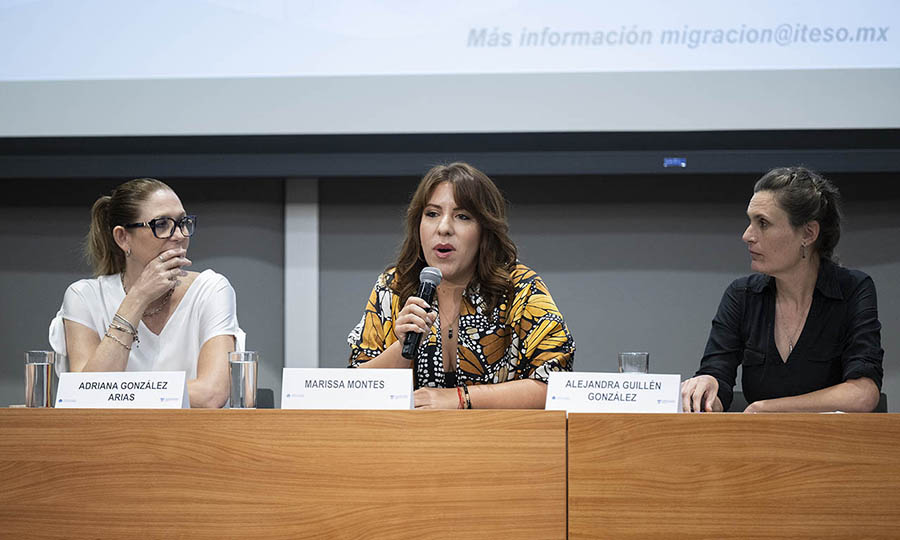
Currently, the course “Migration, Asylum, and Refuge” is offered as part of the complementary studies catalog, and the course “Migration Law” is also included in the curriculum. “It’s a broad menu that we have been developing and putting into practice,” said González.
All three participants in the discussion emphasized the importance of the clinic’s educational role, as well as the essential principle that it is the people and the community who should determine the work to be done. They noted that the goal is to collaborate with other organizations and that the model is intended to be replicated by other universities so they can adapt it to their specific contexts. “We need to be strategic, build connections, and study the different diasporas in order to replicate these clinics,” said Montes.


